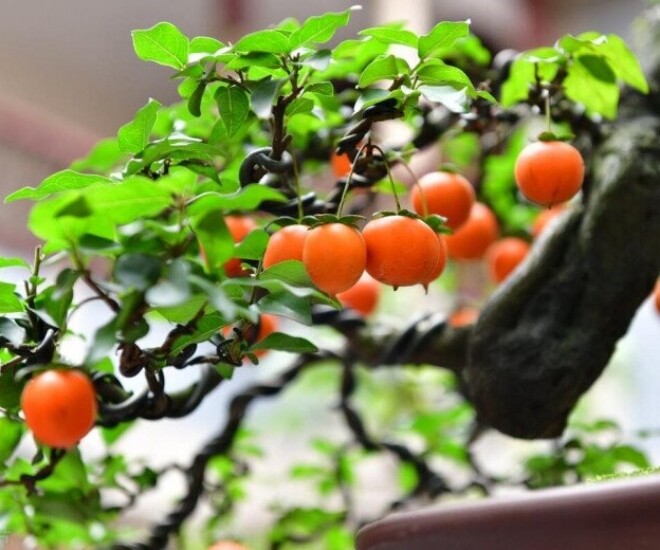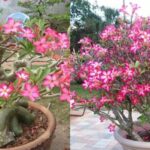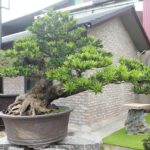The Golden Marble tree, with its unique shape and golden leaves tinged with white and emerald green, is likened to a “flower of wealth and prosperity.” This exquisite beauty, reminiscent of marble, graces any room with its refined elegance. During its blooming season, the tree bears petite, rose-like flowers with thick, pink petals that resemble crystal. As if that weren’t enough to captivate, the tree also bears fruit—a true golden wonder, with oranges and yellows hanging from its branches like pure gold, earning it the name, “the tree that bears gold.”
In ancient beliefs, the Golden Marble tree symbolizes wealth and good fortune. Having this tree in your home is thought to attract money and luck while warding off misfortune. Its leaves shine like gold, signifying abundance and stability in one’s financial endeavors.

This tree is remarkably low-maintenance, thriving in sunlight but also adapting well to partial shade. Place it near an east- or south-facing window or balcony to promote its vigorous growth and maintain its vibrant leaves year-round. The Golden Marble tree is resistant to most pests and diseases, requiring watering only 2–3 times a week to keep the soil moist, but not waterlogged. It truly thrives in the sun, with its leaves becoming more dazzling the more sunlight they receive.
Additionally, the Golden Marble tree is a long-living plant with gracefully curving stems, making it ideal for bonsai. Many consider it a living work of art and a lucky charm for their homes. If you seek a plant that is not only beautiful and easy to care for but also holds profound symbolic meaning, the Golden Marble tree is the perfect choice to adorn your living room or workspace, infusing your space with freshness and abundance.
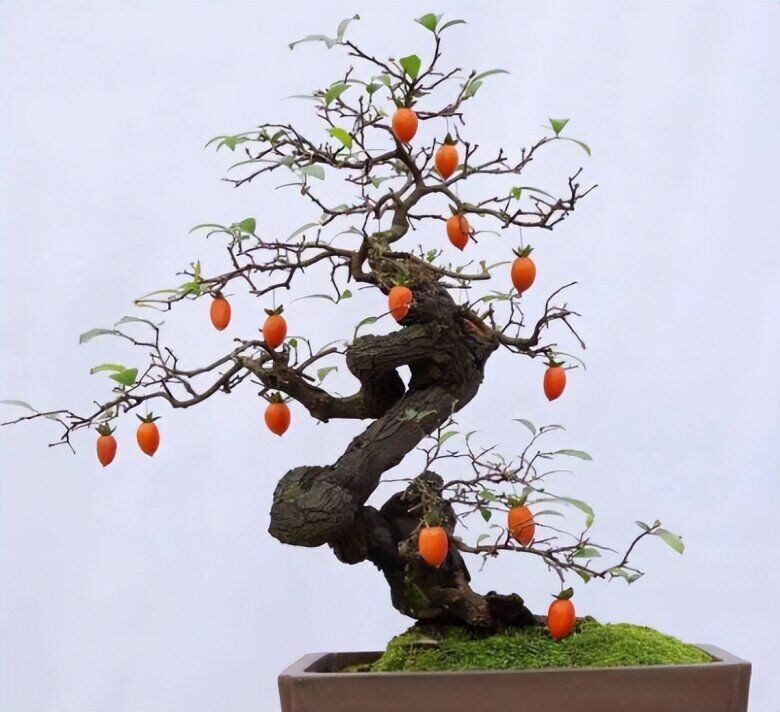
The Buddha’s Hand Citron
The Buddha’s Hand Citron, or “Phật thủ” in Vietnamese, captivates many with its unique appearance. Its fruit resembles a human hand, and when ripe, it takes on a golden hue, appearing as if it were gilded. The fragrance of this fruit is also remarkable—a subtle, soothing aroma that fills the air with a sense of calm, easing anxiety and promoting restful sleep while purifying the air in your home.

Beyond its beauty and scent, the Buddha’s Hand Citron holds deep symbolic meaning in feng shui. It represents longevity, good fortune, and the fulfillment of wishes. As such, many families choose to grow this tree in their homes to invite peace and attract positive energy.
This tree thrives in sunlight, ideally placed where it can soak up 4–6 hours of sunshine daily. Water it when the soil dries out to a depth of 2–3 cm, approximately every 10–15 days. At the beginning of winter, add some well-rotted organic fertilizer, discontinuing fertilization as the weather turns colder.
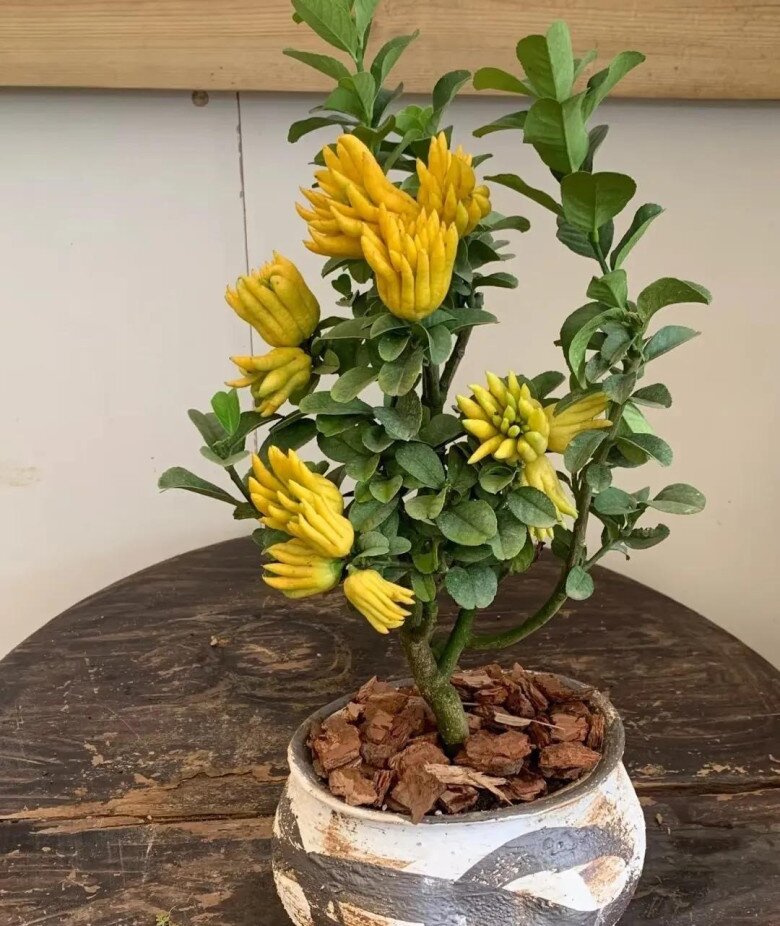
Kumquat Tree
The Kumquat Tree, or “cây kim quất” in Vietnamese, is a symbol of wealth and good fortune in feng shui. The word “quất” in Chinese sounds similar to the word for “good luck,” while “kim” represents money. Thus, the Kumquat Tree is believed to bring prosperity and abundance to those who display it in their homes.
When choosing a Kumquat Tree for your home, select a healthy specimen with straight stems, lush green leaves, and round, shiny yellow or red fruits. These characteristics signify abundance, wealth, and career advancement. Conversely, a sickly tree with wilted leaves and sparse fruit can negatively impact the energy and business of the household.
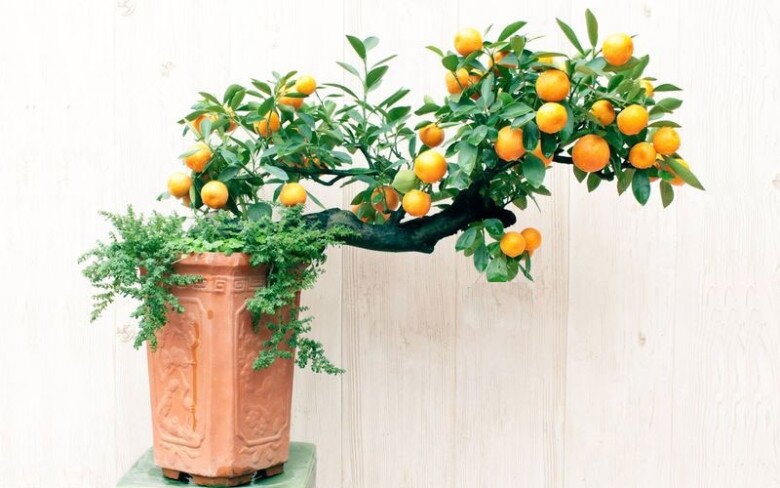
To maximize the tree’s ability to attract wealth and positive energy, proper care is essential. Kumquat Trees thrive in sunlight and dislike shade, so place them in a bright, sunny spot like a balcony or near a window. The ideal location for the tree is in the financial corner of your home or near the front door to invite good luck and enhance the family’s overall energy.
The subtle fragrance of the fruit uplifts the spirit, and the tree’s year-round greenery brings a sense of joy. The Kumquat Tree is an excellent choice for home decoration, especially during the Lunar New Year, as it symbolizes health, peace, and prosperity for the coming year.
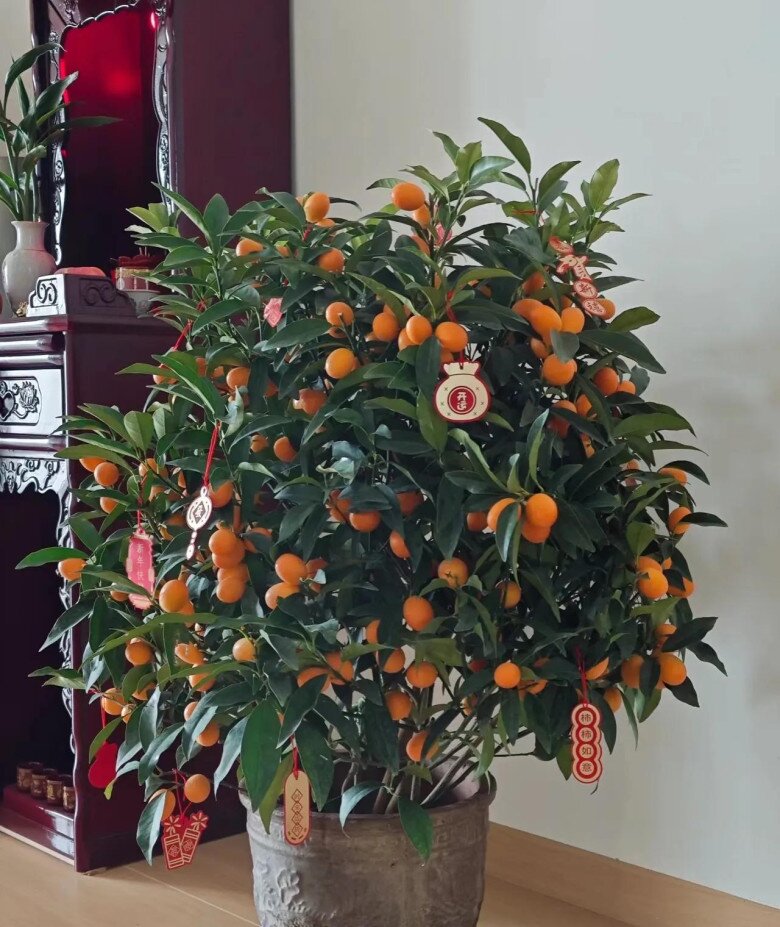
The Golden Eggplant
The Golden Eggplant, or “cây dư thừa” in Vietnamese, is a striking plant with scientific name Solanum mammosum, belonging to the Solanaceae family. It boasts vibrant golden fruits that resemble eggs, earning it the nickname “the golden egg plant.” These fruits can last for 4–6 months and are often used in decorative arrangements, floral art, and as festive decorations during the Lunar New Year. Its unique appearance and brilliant color have led to its association with attracting wealth and good fortune.
In folk beliefs, the Golden Eggplant symbolizes abundance, prosperity, and the well-being of the family. Displaying this plant in your home brings a burst of vitality to your space while attracting positive energy, luck, and success. It truly enlivens any room with its sunny disposition.
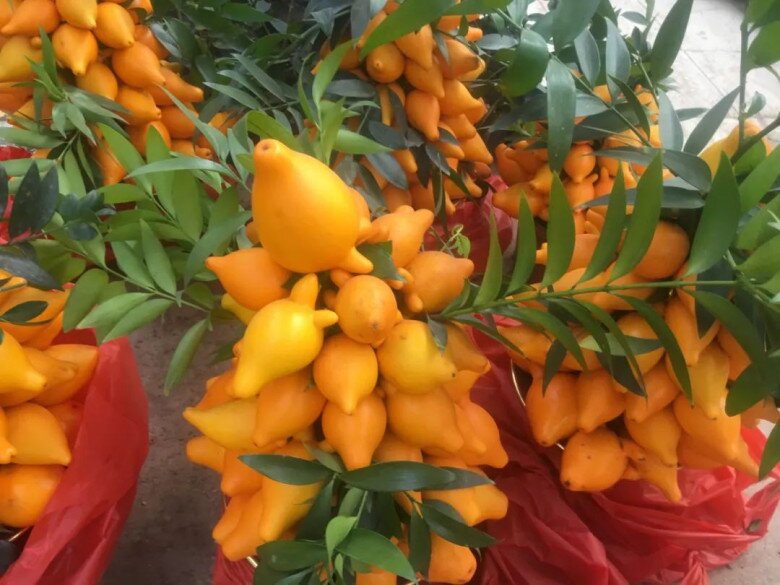
The Golden Eggplant thrives in bright, indirect light and is well-suited for balconies, windowsills, or well-lit living rooms. During winter, maintain a temperature above 15°C to prevent cold damage. Allow the soil to dry out to a depth of 2–3 cm before watering thoroughly, avoiding water stagnation, which can cause root rot. This plant is also relatively pest and disease-free, making it an excellent choice for beginners in gardening.
However, it’s important to note that the fruits of this plant are toxic, so take extra care if you have children or pets in your home.
Should You Plant a Bougainvillea in Front of Your House? Uncover the Unique Feng Shui Meaning That Few Know
The bougainvillea is a vibrant and auspicious plant, often revered for its positive feng shui symbolism. This lush plant, with its vibrant hues and lush foliage, brings a burst of energy and good fortune to any home it graces. It is particularly recommended to be planted in front of houses, where its vibrant presence can attract positive energy and bring prosperity to the residents within.
The Magic of Fruit Trees: Transforming Nature’s Bounty into Stunning Bonsai Art, Adorning Homes with Nature’s Golden Treasures.
The peach-shaped fruit is believed to be a symbol of longevity. Its delicate beauty and sweet flavor have captivated cultures around the world, each with their own unique traditions and tales surrounding this enchanting fruit. With its graceful form and enchanting taste, it’s no wonder that the peach has become an enduring symbol of health and longevity in many cultures.
























